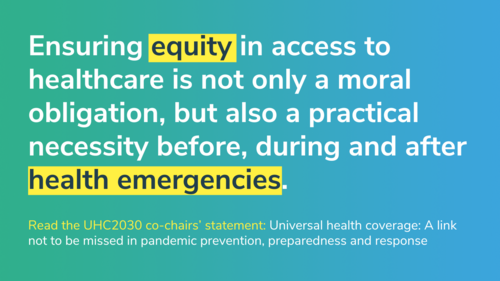UHC2030 hosted its annual UHC Day parliamentarian town hall to...
23 September 2024
Pandemic Treaty negotiations (INB11) take a positive step forward in recognizing the importance of universal health coverage for effective pandemic preparedness and response

With the 11th meeting of the Intergovernmental Negotiating Body (INB) to draft and negotiate a WHO convention, agreement, or other international instrument on pandemic prevention, preparedness and response having drawn to a close, we, the UHC2030 Co-chairs, are pleased to see Member States coming together to build on their commitments made in the 2023 Political Declaration of the High-Level Meeting on Universal Health Coverage.
While the pandemic agreement is being negotiated on the principle that “nothing is agreed until everything is agreed”, during INB11 negotiations, Member States have signaled they are unified in their understanding that universal health coverage (UHC)—operationalized through a primary health care approach and with its inherent focus on equity and resilience—is foundational to pandemic prevention, preparedness and response.
Member States’ recognition of the critical role of whole-of-society approaches through broad social participation is another positive step forward for the agreement. Social participation is critical to ensure people-centered health services and build equitable and resilient health systems that respond to the needs of people and communities—including those in vulnerable and marginalized situations—both in crisis and in calm. More inclusive governance in health also provides the basis for creating trust with communities in public health policies and programmes, which is critical for better outcomes during health emergencies.
As negotiations continue to progress, now against the backdrop of the Mpox global health emergency, it is even more crucial that countries use the remainder of this year to find ways to come together as an international community and carve out consensus on the pandemic agreement. We urge Member States to continue to prioritize collective action and keep front and center the need to support health systems – especially the core health systems functions that are essential to protect everyone, promote health and well-being, and detect, assess and report public health events in line with the International Health Regulations.
Member States must continue to keep in mind their UHC commitments on health equity and remember that effective response efforts for all health emergencies must also address equity barriers. This includes financial barriers and barriers due to discrimination, particularly for vulnerable and marginalized populations. Ensuring equity in access to healthcare is not only a moral obligation, but also a practical necessity before, during and after health emergencies. We will only be safe when everyone is safe, and we are only as strong as the most vulnerable members of our global community.
UHC and health security are two intertwined goals to protect everyone, everywhere, and they are achieved through the same health system. With UHC included as a foundational element of the pandemic agreement, we have the key link needed to build a way forward for sustainable pandemic prevention, preparedness and response.
Magda Robalo and Pamela Cipriano, co-chairs of UHC2030
Background:
In December 2021, the World Health Assembly (WHA) established an intergovernmental negotiating body (INB) to draft and negotiate a convention, agreement or other international instrument under the Constitution of the World Health Organization to strengthen pandemic prevention, preparedness and response. The pandemic agreement is still under negotiation, with Member States aiming to improve global coordination and boost the world’s ability to better prevent, prepare and respond to the threat of future pandemics.
The Eleventh meeting of the INB was held in hybrid format from 9-20 September 2024. The opening and closing plenary sessions of the INB are open to WHO Member States, Associate Members, Observers and regional economic integration organizations, as well all relevant stakeholders. To view recordings of these sessions, visit: Eleventh meeting of the Intergovernmental Negotiating Body (INB) for a WHO instrument on pandemic prevention, preparedness and response
More UHC2030 News
A global health financing emergency threatens progress toward...
UHC2030 at HSR2024: Advancing equity and inclusion in health systems through civil society knowledge
UHC2030, in collaboration with the SUPPORT-SYSTEMS research...
